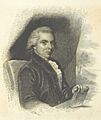John Gillies (historian) facts for kids
John Gillies (born 1747, died 1836) was a smart Scottish man who taught others, wrote history books, and was known for his writing. He was a tutor, a historian, and a "man of letters," which means he was very educated and skilled in writing.
Contents
About John Gillies
Early Life and Education
John Gillies was born in 1747 in a place called Brechin, in Scotland. His father, Robert Gillies, was a merchant. John went to school in Brechin. Later, he studied at the University of Glasgow.
When he was only twenty years old, he briefly filled in for the Greek professor at the university. He earned his Master of Arts (MA) degree in 1764. He also spent some time living in Germany. He returned to Scotland in 1784 and received a special doctorate degree (LLD) that same year.
Important Roles and Honors
John Gillies became a very respected scholar. In January 1789, he was chosen to be a Fellow of the Royal Society. This is a big honor for scientists and thinkers.
A few years later, in 1793, he was also elected a Fellow of the Royal Society of Edinburgh. Important people like James Gregory and John Playfair suggested him for this role.
After another famous historian, William Robertson, passed away, John Gillies was given a special job. He became the Historiographer Royal for Scotland. This meant he was the official historian for the country.
Later Years
In his older years, John Gillies moved to a place called Clapham. He passed away there on February 15, 1836. He had an older brother, Adam Gillies, Lord Gillies, who became a judge.
John Gillies's Books
John Gillies wrote many important books, especially about history.
History of Ancient Greece
One of his most famous books was History of Ancient Greece, its Colonies and Conquests. It was published in 1786. This book was so popular that it was translated into French and German.
In this book, Gillies showed a strong belief in having kings and queens rule. He thought that having a king or queen who inherited their power was the best way to keep people free and safe. He believed that other types of government, like democracies (where people vote), could be messy or lead to unfair rulers.
Other Writings
John Gillies also wrote and translated other important works:
- View of the Reign of Frederic II of Prussia, with a Parallel between that Prince and Philip II of Macedon (1789): This book looked at the rule of King Frederic II of Prussia.
- Translations of Aristotle's Rhetoric (1823) and his Ethics and Politics (1786–1797): He translated important works by the ancient Greek philosopher Aristotle.
- Translations of the Orations of Lysias and Isocrates (1778): He translated speeches by ancient Greek speakers.
- History of the World from Alexander to Augustus (1807): This book covered a long period of history, from the time of Alexander the Great to the Roman emperor Augustus.
Images for kids
 | Stephanie Wilson |
 | Charles Bolden |
 | Ronald McNair |
 | Frederick D. Gregory |


